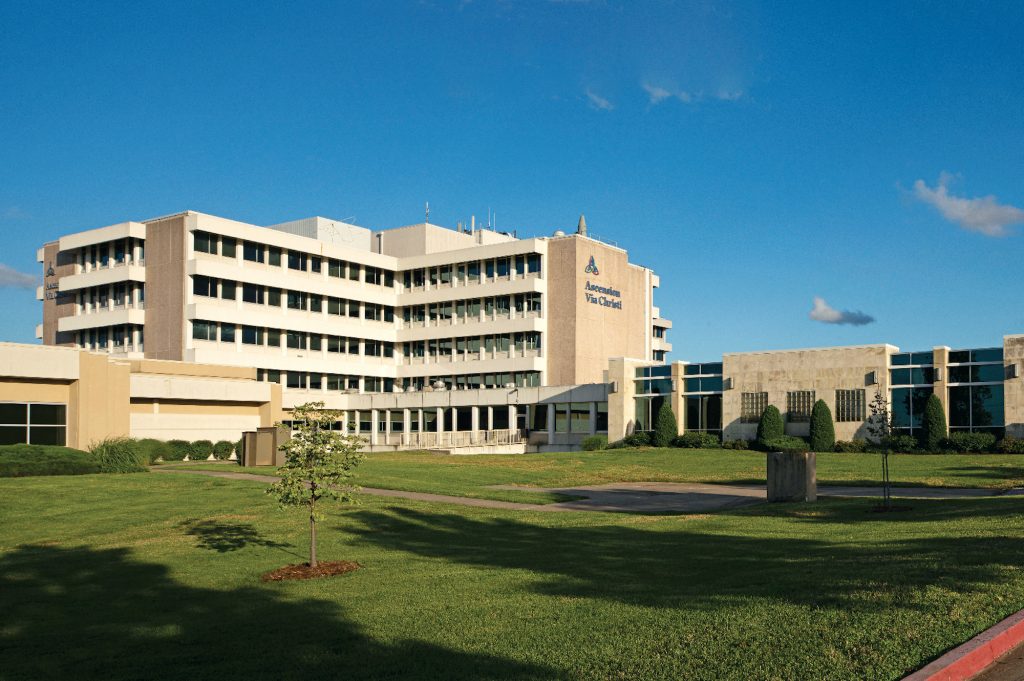The name will change but a Catholic hospital will continue to serve Pittsburg

Pittsburg area residents will see signage changes at Ascension Via Christi Hospital in Pittsburg in the next few months, but the transfer of the facility to the Mercy Hospital system won’t affect patient care and will likely result in more convenience.
Drew Talbott, president of Ascension Via Christi Hospital Pittsburg, said the process began well over a year ago and that the first of three phases in transitioning to the Mercy Hospital system will begin on Sept. 1 with a transfer of ownership. The third phase will be complete around July of 2025 when an Epic Systems Corporation inpatient information system will be ready to use.
A transition period
“There will be, during that period of time, a contract set up for transition services where Ascension is still going to be providing some services for us while we’re on some of these old systems,” he said, adding that the transition primarily involves the hospital campus buildings and outpatient practices.
“There will be minimal changes in the benefit structure and compensation,” he said. “Obviously pay practices don’t align perfectly, but they’re very similar. It’s two Catholic organizations and we behave pretty similarly.”
More convenience
Patients may find the transition more convenient, Talbott said, because a tertiary care hospital is only 30 miles away. Mercy Hospital in Joplin offers a higher level of healthcare for patients with advanced and complex needs.
“One of the things that we have historically had difficulty doing is convincing patients to go to Wichita, which is kind of our parent or tertiary care hospital that’s 150 miles away. They prefer to go to Joplin, which is 30 miles away. As far as convenience for our patients, they’ll have a higher level of care closer to home.”
The proximity of the two hospitals will also be convenient for the two Mercy facilities, Talbott said. “It’ll provide a higher level of patient continuity, particularly for specialty services, while at the same time strengthening the operation here in Pittsburgh.”
Having sister hospitals so close will allow both hospitals to share equipment and workforce, when necessary, he said.
Jeremy Drinkwitz, the president of Mercy Joplin communities, said in a Feb. 15 news release that he is thrilled to bring the hospital into the Mercy system.
Continuing a legacy of care
“We’ve been impressed with the care Via Christi has provided Pittsburg for years, and we want to continue that long legacy of Catholic health care. We’re 100% committed to caring for Pittsburg and all of Southeast Kansas for years to come.”
Mercy currently operates two hospitals in Kansas – Mercy Hospital Columbus and Mercy Specialty Hospital – Southeast Kansas in Galena – and two primary care clinics.
Kevin Strecker, Ascension Via Christi’s president and chief executive officer, said the transition will ensure that the Pittsburg community has sustainable, quality healthcare access long into the future.
“Ascension Via Christi in Pittsburg has been committed to our mission of serving all persons, with special attention to those who are most vulnerable. As a regional provider, Mercy is well positioned to carry on this legacy, serving the community through an integrated care delivery system,” he said.
Fr. Lanzrath: move ensures a continuity of healthcare
Fr. John Lanzrath said the change of ownership ensures the continuity of Catholic healthcare in Southeast Kansas.
The transfer is the result of months of consultation between the Ascension and Mercy hospital systems, he said. “That discussion was brought to Bishop Kemme about the possibility of Mercy acquiring the hospital in Pittsburg to be able to provide a continuum of care. Bishop Kemme wanted to make sure that we can do everything possible to provide Catholic care opportunities for all of the people of the diocese.”
Fr. Lanzrath, the pastor of St. John the Evangelist Parish in El Dorado and the diocesan liaison for Catholic health care, said it is becoming tough for hospitals in rural areas to operate – Catholic and non-Catholic – for various reasons. “Ascension and Mercy were very good in keeping close communication with Bishop Kemme, letting him know what was happening.”
Health care challenges
Other regions in Kansas are also facing challenges in maintaining health care, he said.
“Bishop Kemme’s concern continues for many hospitals in the state of Kansas that are now in dire situations,” Fr. Lanzrath said, “Not only for staffing and nurses but…nursing homes and assisted living facilities. It’s a critical issue as far as being able to provide adequate care.”
New federal staffing mandates will soon require 3.48 hours of daily nursing care for each resident, nearly double the current minimum set by Kansas regulators. Facilities in urban areas have two years to comply, and those in rural areas have three.
Nursing home challenges
If nursing homes cannot meet state requirements they will be forced to close, he said.
“The whole issue of health care right now – especially in rural parts of the state of Kansas – that’s a grave concern. Bishop Kemme is very well aware of that. He wants to do everything possible to provide the opportunity for health care services, but especially, if possible, operated by Catholic health care facilities that would be consistent with the ethical and religious directives for Catholic health care.”
